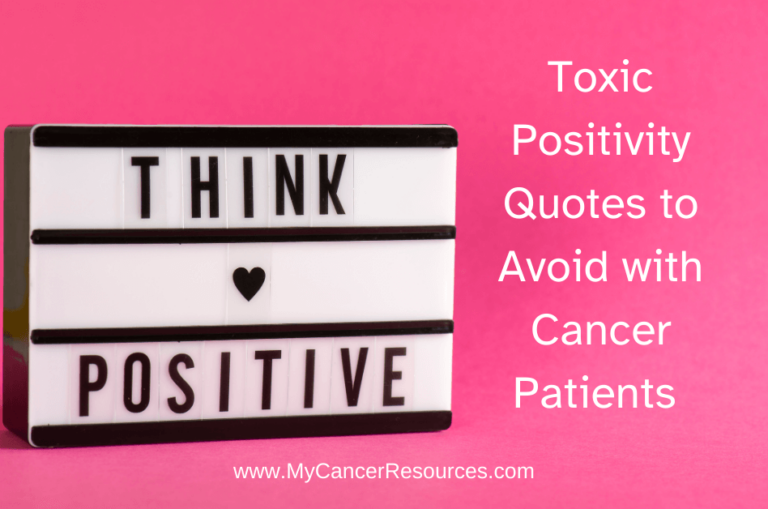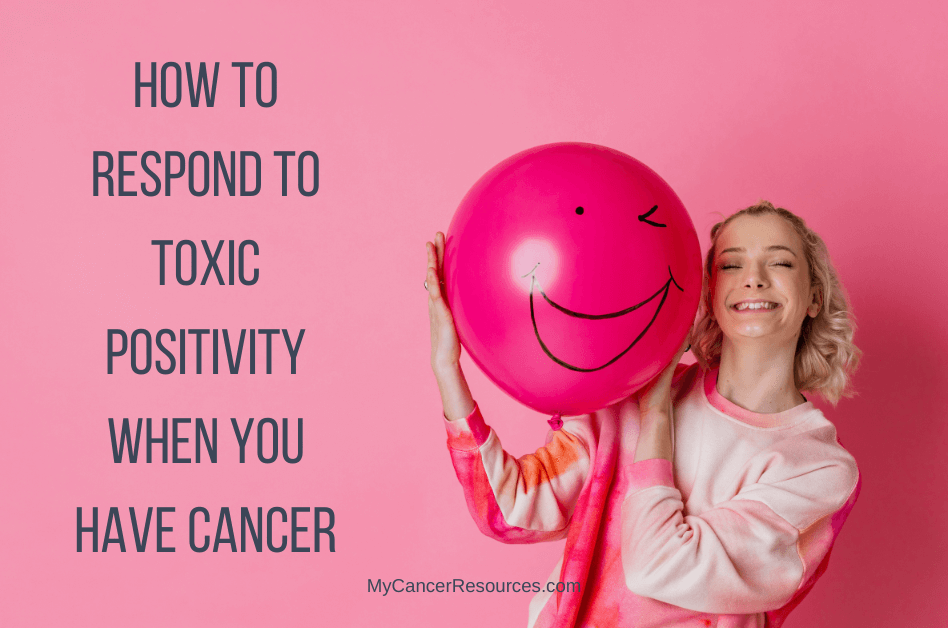
Defining Toxic Positivity
Toxic positivity is the pressure to be upbeat and positive constantly and to suppress any negative feelings or thoughts.
It can stem from believing that acting, thinking, or speaking only about positive things will keep negativity from entering one’s life. This couldn’t be further from the truth.
Toxic positivity encourages someone to always look at the bright side and find the silver lining in every cloud. But it’s not as simple as a motivational quote on social media makes it seem.
Preaching only the pursuit of happiness is unhelpful. It pressures the other person to brush aside their true feelings and pretend that everything is okay when it’s not.
And let’s face it: there’s a LOT about cancer that is not happy.
Toxic positivity ignores the complex emotions that come with a cancer diagnosis. Instead, it suggests that the only emotions worth feeling or expressing are positive ones.
This is an unrealistic expectation that dismisses the negative experiences and can also leave the other person feeling misunderstood or isolated.
It implies their feelings are invalid because they’re not bursting with positivity.
Toxic positivity can add yet another burden to the person with cancer.
It’s like they aren’t allowed to have bad days. Or at least they can’t share with others when they’re feeling sad, angry, confused, depressed, etc.
So they feel like they need to stuff those emotions down.
There’s added pressure to slap on a smile and appear happy-go-lucky, even if they’re miserable inside.
This ignores their real, difficult experience, which can hurt their mental health even more.
Finding a healthy way to express all emotions, not just the positive ones is important. It’s okay not to be okay.
Typically, the person spouting toxic positivity quotes is the one who is truly uncomfortable with addressing the emotions the person with cancer might be experiencing.
So by saying something catchy like “Good vibes only!” they feel better about themselves by trying to cheer their friend up while they also protect themselves from hearing about or dealing with messy emotions.
But what happens is that the person with cancer can feel dismissed and invalidated. It can increase their suffering and make them feel alone and unsupported.
That’s likely the last thing you want your friend to experience, so it’s great that you’re reading this to know what not to say!
Accepting Negative Emotions
Not every day is a ray of sunshine; pretending it is can do more harm than good. Accepting and expressing negative emotions is crucial. It’s a healthy way to cope.
Psychology experts tell us that balancing positive and negative emotions leads to a more fulfilling life. Ignoring the bad only makes it worse.
Creating a safe space for ourselves and others to share the not-so-good vibes is vital.
Yes, it may be uncomfortable for you, but if you’re truly trying to be there for your friend with cancer, it may take some discomfort on your part to acknowledge their pain and provide that safe space for them to fully express how they feel.
Identifying Toxic Positivity Quotes
How do you know if what you’re about to say could be considered toxic positivity? Check out these traits of toxic positivity quotes, and if they meet any of these criteria, think of a different way to phrase your comment.
A quote could be toxic if:
- Negative emotions are dismissed: Look for quotes that downplay painful emotions or difficult situations, insisting that a positive outlook is the only way forward.
- Overgeneralized extreme positivity: Phrases that command you to always find the silver linings without acknowledging the real issue.
- Invalidation of true feelings: Quotes suggesting that expressing anything but positive vibes indicates a lack of resilience or strength are misleading.
- Encouragement of emotional suppression: Be wary of messages that advocate hiding true emotions behind a forced smile.
Toxic Positivity Quotes to Avoid
Words of encouragement and promoting a positive mindset can be helpful to someone dealing with cancer if they also honor the full spectrum of emotions that they’re feeling.
Positive thinking can be encouraged as long as it doesn’t promote ignoring negative emotions.
Here are a few toxic positivity quotes to avoid and what to say instead.
Everything happens for a reason.
Technically, yes, cancer developed due to a mutation or change in a cell that led to other changes. There is a biological reason that cancer developed.
But an emotional/spiritual reason why that person got cancer? No, you cannot say that they’ll have some spiritual enlightenment or come to a conclusion about why they developed cancer.
Sometimes bad things happen, and not everyone feels that there is some meaning behind what unfolds in their life.
Instead, say, “I’m so sorry you’re going through this. What’s been the hardest part of this so far for you?”
You’re so strong/such a brave warrior.
While the person with cancer might indeed be a strong individual who’s overcome other difficult things in their life, they don’t have to always be strong.
Many patients say this phrase is bothersome for a few reasons:
a) They really don’t have a choice to fight this disease – if they want to stay alive, they need to fight.
b) Treatments can make them feel anything but strong, but they’re afraid to admit that to people who call them courageous or strong.
c) Just because they’re fighting doesn’t mean they’re brave – they’re terrified but feel like the fighter/warrior messages they hear mean they must always put on a brave face.
There’s no room to admit any weakness. This can be exhausting putting on a front all the time.
Instead, say, “You’re going through so much; how can I help carry some of the load?”
Everything will be okay.
You don’t know this, so it’s unfair of you to make this promise. Their cancer experience can go any number of ways.
Even though you want everything to be okay, there’s no guarantee that it will be. A statement like this can lead to false hope.
Instead, say, “We don’t know how this will turn out, but I’m right here with you every step of the way.”
What doesn’t kill you makes you stronger.
Ask almost any person with cancer – they don’t want to be stronger – they want to get through this and survive.
They didn’t ask for cancer so they could build resilience or strength. Instead, cancer swept in and uprooted their life.
And yes, cancer can most definitely kill them. So, it’s in poor taste to share this quote.
Instead, say, “How can I support you right now?”
Good vibes only/Just be positive
Though there’s a popular belief that thinking or expressing only positive thoughts leads to positive outcomes, this doesn’t always happen.
Bad things happen in life. Life is messy, especially when cancer is involved. It’s unrealistic to expect or demand someone stay positive all day, every day with cancer.
This isn’t to say that positive thinkers don’t feel better – lots of studies have shown the power and benefits of positive thinking.
However, statements that imply only one emotion can be expressed minimize the other emotions the person with cancer might be feeling.
This statement can also be incredibly hurtful to someone dealing with depression. Depression is very common in both cancer patients and survivors, and it is easy to understand why someone with cancer could be depressed.
This statement implies that by simply thinking or speaking positively, they can eliminate their depression. This can lead to them feeling ashamed of being depressed.
Instead, say, “All your feelings are valid, and I imagine you’re experiencing many emotions right now. I’m here to listen if you’d like.”
Have an attitude of gratitude/You have so much to be grateful for.
Like positivity, gratitude has been shown to improve mental health by decreasing stress, anxiety, and depression, which is why I offer gratitude journals in my shop.
But forced gratitude defeats the purpose.
This statement in itself isn’t the wrong approach to take. But if your friend comes to you venting some frustration or worry and you respond with, “Just be grateful for what you do have, ” this shows a lack of empathy on your part.
Your friend felt comfortable enough with you to share a legitimate feeling, and the response indicated that their feeling wasn’t valid. Instead, the only way to deal with frustration is to think of something they’re grateful for.
This type of toxic positivity quote could encourage them to hide their true feelings and make them think you’ll only be around if they remain optimistic.
They likely don’t want to lose you as a friend, so they’re forced to put their true feelings aside and only express the socially acceptable ones. This is unfair to them.
People can still be grateful for the good things while mourning losses or expressing anger. It’s important to acknowledge both good things and bad things in life. We have a right to feel and express our feelings even when we also have positive things we are thankful for.
Instead, say, “Life is so messy, and I’m so sorry this is happening.” or “Not every day is good, but there is good in every day.”
God/the Universe won’t give you anything you can’t handle.
This quote could be tricky, especially if you don’t know their spiritual/religious beliefs. Even if they have strong beliefs, this may not be what they want to hear right then.
Instead, only respond if they first make this statement and provide an opening for them to discuss their beliefs with you.
It could always be worse.
This could be true, but for a person with cancer, it may be hard to imagine anything worse than what they’re experiencing.
And you don’t fully know what they’re going through, so diminishing what they’re feeling could be devastating to them.
Instead, don’t say anything at all. There’s no reason to mention this, and it’s better to sit in silence than say something that could be hurtful.
Think happy thoughts/Just stop thinking about it.
We can’t always control the thoughts that pop into our heads. We can control if we dwell on them or take action on them.
But this statement makes the person with cancer feel like they need to bury their feelings. In turn, they can feel responsible and guilty for having any negative thoughts.
Instead, say, “You must be experiencing a lot of emotions right now. It’s okay to feel whatever you’re feeling. Want to talk about it?”
Creating a Safe Space for All Emotions
It’s important to accept and honor all emotions, not just the positive ones. Creating a safe space for expressing feelings can be one of the best gifts you can give your friend or loved one.
This means validating their true feelings without rushing to put a positive spin on painful emotions.
It’s about letting the bad days have their place, too, without the pressure of finding a silver lining in every difficult situation.
Don’t let your own discomfort and fears about hearing someone else’s feelings and experiences. If you think you may say something wrong, simply say nothing.
Or you could say, “I’m not sure how to respond, but I want you to know I am always willing to listen.” There’s nothing wrong with admitting you don’t know what to do or say.
Your honesty could help them feel more comfortable with being vulnerable as well.
Be a good listener, show empathy, and avoid dismissive phrases like the ones mentioned above.
Remind them it’s okay not to be okay and that everyone has the right to feel every emotion without judgment.
Your support and encouragement to acknowledge and feel everything they’re feeling can be such a support to someone with cancer.
Many people in their life will likely dump these toxic positivity quotes on them to rush through the conversation and move on to something more lighthearted.
Your willingness just to sit, even in silence, can help them feel heard and supported.


